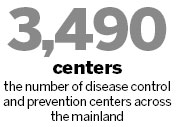More govt action urged to prevent spread of diseases
Updated: 2013-08-29 07:26
By Shan Juan (China Daily)
|
||||||||

Despite having the world's largest Web-based reporting network for infectious diseases, China faces a myriad challenges to prevent them from spreading largely because of the high incidence of new infections as well as the nation's mass population migration, a top health official said on Wednesday.
Li Bin, head of the National Health and Family Planning Commission, made the remarks during the ongoing bimonthly session of the National People's Congress Standing Committee. At the session, she made a report on how the government has implemented the Law on Prevention and Treatment of Infectious Diseases.
"The government will improve monitoring and warning systems to ensure early discovery, diagnosis, reporting and treatment of infections. More efforts must be made to combat diseases including HIV/AIDS, tuberculosis and hepatitis B," she said.
Li said China is currently at risk of both traditional infectious diseases, such as tuberculosis and HIV/AIDS, and new emerging infections, such as the H7N9 bird flu and swine flu.
Over the past decade, new types of infectious diseases have struck the country every one or two years, she said. Given the difficulties in detection, diagnosis and treatment, high death rates could occur at the onset of a new infectious disease, she said.
According to a report by the Education, Science, Culture and Health Committee of the NPC, how authorities and health officials communicate and share information should be strengthened, particularly in cases of infections of humans and animals.
A study of 12 Chinese provincial-level regions found that a majority of them had never investigated whether animals could be sources of past infections and they never carried out pre-emptive intervention efforts, the committee's report said.
Agriculture, water and forestry departments are responsible for carrying out these measures, it said.
In April, agriculture and health authorities were criticized for being slow to share information on how to contain the H7N9 bird flu strain. Critics pointed out that there was a one-month gap between the first human death from H7N9 and the first detection of the virus in pigeons.
Feng Zijian, director of the health emergency center of the Chinese Center for Disease Control and Prevention, said, "Cooperation and the exchange of information between health and agriculture departments should be enhanced regularly to better contain infections for both men and animals."
To effectively control infections, he urged the nation's decision-makers to outline specific responsibilities, tasks and communication systems for government agencies.
Qiu Renzong, a leading bio-ethicist with the Chinese Academy of Social Sciences, said the public should also be made aware of the significance of infectious diseases and how to prevent infections from spreading.
The NPC committee report said work needs to be done to improve public health education. It added that the nation has yet to provide adequate public information about how to control the spread of infectious diseases.
Non-governmental organizations are also encouraged to participate in the drive to curb infectious diseases.
Mass population migration within the country and rising cross-border transit have led to difficulties in disease prevention and control, Li said. In 2012, more than 91 percent of malaria cases found on the mainland were imported, statistics from the commission showed.
Local health agencies must be further educated, and cross-border cooperation must be improved, particularly at borders and at schools, she said.
shanjuan@chinadaily.com.cn
(China Daily USA 08/29/2013 page4)

 US vows action in Syria even without UN backing
US vows action in Syria even without UN backing
 Li Na advances to 3rd round
Li Na advances to 3rd round
 Obama, marchers mark 50 yrs since King's speech
Obama, marchers mark 50 yrs since King's speech
 Singers' son pleads not guilty
Singers' son pleads not guilty
 Rubber duck to float in Beijing
Rubber duck to float in Beijing
 New York Times, Twitter hacked by Syrian group
New York Times, Twitter hacked by Syrian group
 Five apps to help you 'breathe' in Beijing
Five apps to help you 'breathe' in Beijing
 Wozniacki survives battle with Chinese qualifier
Wozniacki survives battle with Chinese qualifier
Most Viewed
Editor's Picks

|

|

|

|

|

|
Today's Top News
China, US officials discuss defense ties
Envoy to seek release of US citizen
China leads the way on multilateral defense co-op
Bond trial program set to expand
China set to lead e-commerce market
US vows action in Syria
Firms 'must foster' jobs abroad
5-yr work plan to fight graft unveiled
US Weekly

|

|






